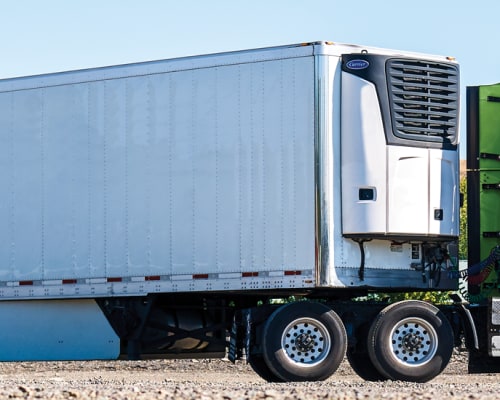Leading Transport Refrigeration Companies Using Advanced Cold Chain Solutions
Leading Transport Refrigeration Companies Using Advanced Cold Chain Solutions
Blog Article
A Comprehensive Review of the Devices Behind Refrigerated Truck Transportation and Its Duty in Food Safety And Security
Refrigerated vehicle transport is essential in maintaining food security, employing sophisticated temperature level control systems and insulation modern technologies to protect subject to spoiling items throughout transit. The integration of innovative tracking systems guarantees real-time oversight, enabling prompt intervention in the event of temperature discrepancies. These essential elements not just preserve the honesty of food products however likewise play an essential duty in protecting against foodborne health problems. Recognizing how these systems work with each other increases vital concerns concerning their efficiency and potential areas for enhancement within the industry. What implications do these factors have for the future of food security?
Value of Refrigerated Transport
Cooled transportation plays an essential function in keeping the honesty and safety and security of disposable goods throughout the supply chain (transport refrigeration). This specialized logistics system is vital for preserving the high quality of food products, consisting of fresh fruit and vegetables, milk things, meats, and seafood, which are at risk to spoilage when subjected to temperature level fluctuations. The capability to keep a constant and regulated atmosphere makes sure that these goods retain their nutritional value, taste, and safety and security for customers
Furthermore, chilled transport decreases the risks of foodborne illnesses, which can develop from the development of hazardous germs in improperly saved items. By adhering to rigorous temperature level demands, services not only follow governing requirements however also foster customer count on and brand name integrity. The economic ramifications are substantial; reduced perishing prices convert to lower losses for retailers and providers, contributing to general profitability.
Furthermore, the enhancing international need for fresh and high-quality foodstuff even more emphasizes the value of cooled transport. As supply chains end up being much more complex and prolong internationally, the demand for efficient temperature-controlled logistics proceeds to grow, underpinning the whole food circulation network and ensuring that disposable items reach their destinations safely and efficiently.
Temperature Control Systems
Maintaining optimal temperature level control is vital in the transportation of perishable products, and a range of mechanisms are employed to accomplish this objective. Refrigerated vehicles make use of innovative refrigeration systems, mainly making use of vapor compression innovation, which distributes cooling agent through evaporator and condenser coils to draw out heat from the cargo area. This procedure makes certain that the interior stays regularly great, therefore preserving the quality and safety of the products being transported.
Additionally, vehicles are equipped with temperature monitoring systems that supply real-time data on the internal environment. These systems commonly consist of digital sensing units and alarms to alert operators in situation of temperature level changes, enabling instant restorative activities. Some refrigerated vehicles also feature programmable temperature setups, allowing for specific control tailored to specific sorts of cargo, such as pharmaceuticals, vegetables, or fruits.
Additionally, using pre-cooling strategies before loading enhances the performance of temperature level control. By reducing the cargo area's temperature level before the introduction of products, the danger of temperature level spikes throughout transport is reduced. These systems jointly contribute to a reliable cold chain, necessary for maintaining the stability and security of perishable food items throughout the transport procedure.
Insulation Technologies
Insulation modern technologies play an important role in enhancing the performance of cooled truck transportation by reducing thermal exchange between the cargo area and the exterior environment. Effective insulation is crucial for preserving the called for temperature level for perishable goods, therefore guaranteeing food safety and high quality during transportation.
Typical insulation products used have a peek at this site in refrigerated trucks consist of polyurethane foam, polystyrene, and fiberglass, each providing varying degrees of thermal resistance. Polyurethane foam, known for its exceptional protecting residential properties, is usually applied as stiff panels that can be built to fit the vehicle's inside. Polystyrene supplies a lightweight option while still offering sufficient thermal security. Fiberglass, although less usual, can be reliable in specific applications because of its toughness and resistance to dampness.

Advanced Monitoring Equipment
To make sure the integrity of perishable goods throughout transport, advanced monitoring systems have become a critical technology in the cooled vehicle industry - transport refrigeration companies. These systems make use of a combination of sensing units, information loggers, and real-time tracking technologies to continually check temperature level, humidity, and general freight problems throughout the journey. By giving instant responses on environmental variables, these systems permit for prompt restorative actions, therefore protecting item quality
Modern monitoring systems are geared up with wireless connection, enabling seamless information transmission to logistical centers and stakeholders. This connectivity assists in remote surveillance, which is crucial for keeping compliance with sector regulations and requirements. Alerts can be generated in real-time, informing drivers of any kind of inconsistencies from pre-set limits, thus reducing the risk of putridity.
Moreover, the assimilation of advanced analytics and artificial intelligence formulas boosts predictive capabilities, allowing for far better planning and risk analysis. Historical data accumulated from these systems can notify future transportation approaches, maximizing paths and lowering prospective hazards. Overall, the implementation of advanced tracking systems represents a substantial innovation in the refrigerated transportation field, enhancing the dedication to maintaining the high quality and safety of perishable products throughout their trip.
Effect On Food Safety Requirements
The combination of advanced surveillance systems in refrigerated vehicle transport has considerably influenced food safety and security criteria throughout the supply chain. These systems make it possible for find out here now real-time tracking of temperature level, moisture, and various other vital specifications important for maintaining the integrity of subject to spoiling items. By making sure that products remain within defined temperature varieties during transportation, these modern technologies mitigate the threat of microbial growth and spoilage, which are crucial in food security.

The fostering of data analytics likewise permits for proactive decision-making, making it possible for companies to recognize possible concerns before they escalate right into food security offenses. Consequently, the unification of advanced tracking systems not just improves operational efficiency however additionally fosters higher liability in the food supply chain. This find out here now evolution highlights the vital duty of innovation in boosting food safety and security criteria and guaranteeing consumer self-confidence in the products they get.
Verdict
Finally, refrigerated truck transport is necessary for keeping food safety with reliable temperature control, advanced insulation innovations, and continual surveillance systems. These mechanisms function synergistically to preserve the high quality of subject to spoiling goods and decrease the danger of foodborne illnesses. Adherence to strict food security requirements is attained through the execution of these technologies, highlighting the crucial role of refrigerated transport in the food supply chain and its effect on public health and wellness.
Chilled vehicle transport is important in preserving food security, using sophisticated temperature control mechanisms and insulation technologies to guard subject to spoiling items throughout transportation - transport refrigeration. Correct upkeep of insulation honesty, including regular checks for wear or damages, is additionally necessary to endure the performance of chilled transportation systems and guarantee compliance with food safety laws
The combination of sophisticated tracking systems in chilled truck transportation has significantly affected food security standards throughout the supply chain.In verdict, cooled truck transport is essential for keeping food security via efficient temperature control, advanced insulation modern technologies, and constant tracking systems. Adherence to strict food safety and security requirements is attained with the implementation of these modern technologies, highlighting the crucial role of refrigerated transport in the food supply chain and its impact on public wellness.
Report this page